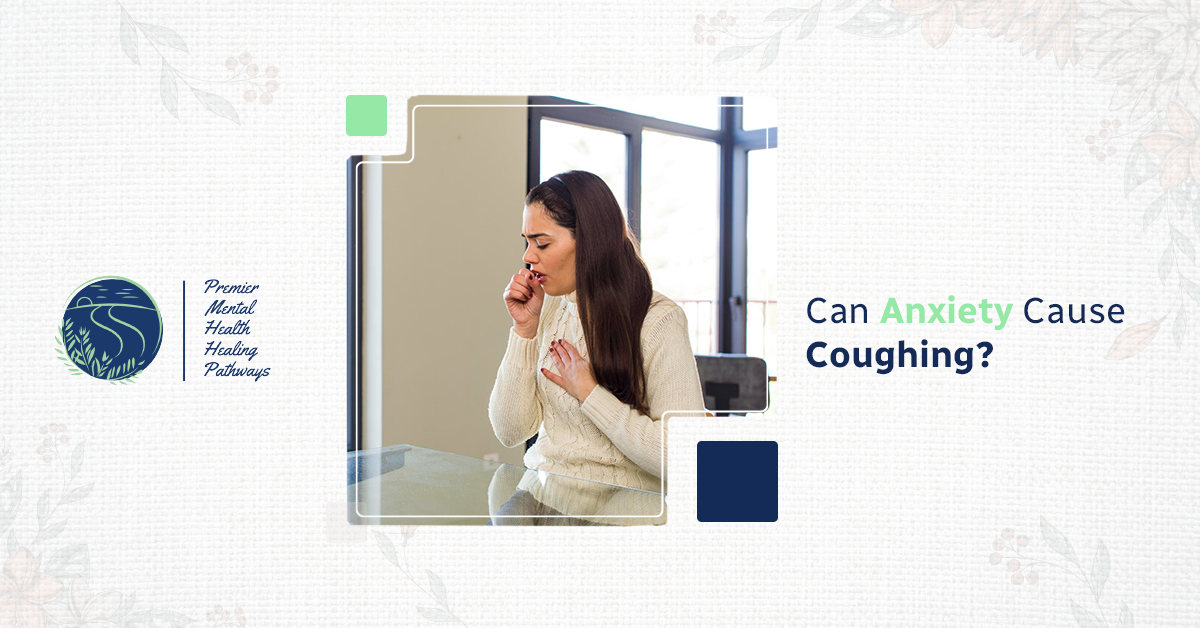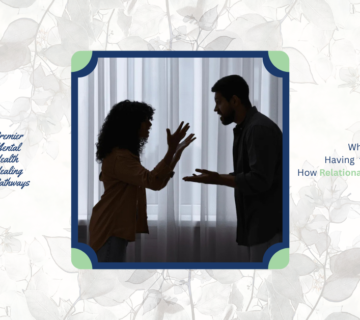We’ve all wondered about odd triggers for coughing, like sipping a cold drink. But what about other causes? Can anxiety cause coughing? We can all identify that sensation of rapid heartbeats, sweaty palms, and a foggy mind. That’s anxiety. You might not realize that anxiety can trigger coughing. It sounds strange, right? This discussion will look at how stress and anxiety lead to coughing. We will explain why cold drinks can cause coughs. We’ll also give you solutions for lightheadedness from coughing. Let’s explain it!
Struggling with anxiety or a persistent cough? Premier Mental Health Healing Pathways offers gentle, expert care to heal the mind and body. Contact us today.
Can Anxiety Cause Coughing? Let’s Find Out!
Yes, coughing can be caused by anxiety! Stress or fear kicks your body’s fight-or-flight response off. By contracting the muscles while breathing faster, throat dryness or scratchiness can occur. Several people have a cough because the squeezing of the muscles in their throat due to anxiety makes them feel suffocated. Your body acts like a security system. It works hard to protect you from danger, but sometimes it overreacts.
Can Stress Cause Coughing Attacks?
Picture this: you’re balancing on the precipice of a pivotal test. Your heart races like a wild drum, and an unwelcome cough crashes the scene. Stress tends to brew these troublesome coughs by scrambling your breath. When stress takes control, you might inhale too quickly or too lightly. This is called “hyperventilation.” It can lead to a nagging cough.
Tip: Master slow breathing. Inhale deeply for four seconds. Then, exhale softly for six. This calming technique relaxes your system and can silence those pesky coughs.
The Hyperactive Cough Reflex: Why Your Throat Is Extra Sensitive
A hyperactive cough reflex exists in some individuals. Their throat sensitivity is heightened to dust particles, smells, and stressful situations. Anxiety tends to escalate throat sensitivity through its continuous state of alertness. Throat tickles occur more frequently when you worry about coughing in public situations. Though no threat exists, your throat works with your brain to trigger coughing.
Why Does Cold Stuff Make Me Cough?
The sudden need to cough after drinking ice water happens to many people. Drinking cold substances triggers coughing because they deliver unexpected sensations to your throat nerves. The combination of cold air and drinks can activate your cough reflex because anxiety-related throat sensitivity makes your cough reflex more active.
Unlike cold drinks, room-temperature water is a fast way to ease throat irritation.
Getting Dizzy When I Cough: What’s Happening?
When you cough hard, it may cause dizziness and lightheadedness. Air flowing out of the lungs at high speed during coughing causes a temporary blood flow reduction to the brain. Strong coughs from anxious people will worsen their dizziness when they cough.
Did you know? Inhaling for 5 seconds right after you cough helps prevent dizziness.
Can Anxiety Cause Post-Nasal Drip or Sinus Problems?
Anxiety doesn’t only shake your mind. It affects your body, too. Post-nasal drip can catch you off guard. Mucus drips down your throat when you least expect it. Stress hormones inflate your nasal passages, turning them into mucus factories. This unwelcome drip can scratch your throat and spark a coughing fit.
Try this: Spritz a saline nasal spray to clear the airways and soothe that scratchy throat.
The Vagus Nerve and Coughing: A Hidden Connection
Think of your vagus nerve as a vital telephone line. This connection runs between your brain and throat. When anxiety strikes, that line can get overloaded. The result? A tight throat or an unexpected cough. Some people start coughing in the nerve’s grip, the vagus nerve sends signals.
Fun Fact: Humming a tune or gargling water can soothe your vagus nerve. It’s a simple way to help silence that cough!
Fear of Coughing: Trapped in a Cycle
Feeling anxious about coughing in class or at work? That worry can backfire! The more you dread it, the more your throat takes center stage. Each tickle feels like a spotlight, and it’s all you think about. Worry brings on coughing, creating a never-ending loop.
Break the cycle: Engage in a puzzle or game. Distractions make you forget your cough.
Misconceptions about Anxiety: What’s True and What’s Not
Let’s break myths about anxiety!
- “Anxiety isn’t physical.” Incorrect! Anxiety causes problems. It can trigger coughing, dizziness, and stomach issues.
- “Making oneself cough due to anxiety is not real.” Coughing is not only a mental thing. It’s a physical symptom that comes from your body’s stress response.
- “Only kids get anxious.” Anxiety affects people of every age group without exception.
Simple Ways to Manage Anxiety-Related Coughing
-
Stay Hydrated
Warm water with honey coats your throat.
-
Breathe Slowly
Calm your nervous system with deep breaths.
-
Avoid Triggers
Skip icy drinks or smoky areas if they make you cough.
-
Talk to Someone
Sharing your fears can lighten the load.
When Should You See a Doctor?
Most anxiety-related coughs aren’t severe. But see a doctor if:
- Your cough lasts longer than 3 weeks.
- You cough up blood or have trouble breathing.
- Dizziness with coughing happens often.
Final Thoughts: You’re Not Alone!
So, can anxiety cause coughing? Absolutely. Taking charge of your condition will become possible for you. Your body functions to assist you even during anxiety, although it appears to be against you. The combination of patience and minor changes helps you reduce throat discomfort and bring calmness to your mind.
FAQs
What’s a “hyperactive cough reflex”?
It means your throat is extra tickly, even from small things like dust or stress. Anxiety can make this worse.
What if I’m scared of coughing in public?
Fear makes coughing worse. Distract yourself with music or a game.
Can anxiety cause sinus problems?
Yes! Anxiety can cause stress hormones. These hormones can inflame your sinuses. As a result, you may feel stuffy or feel pressured.






No comment